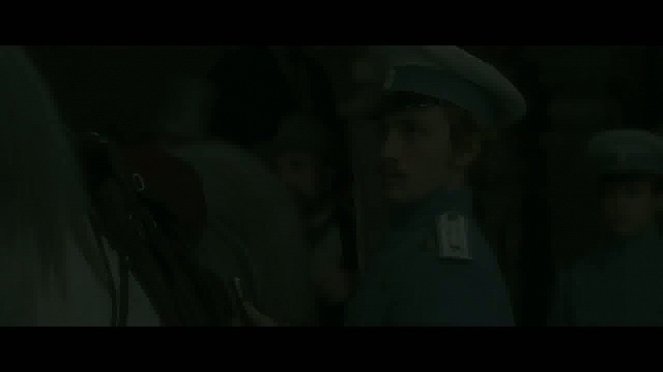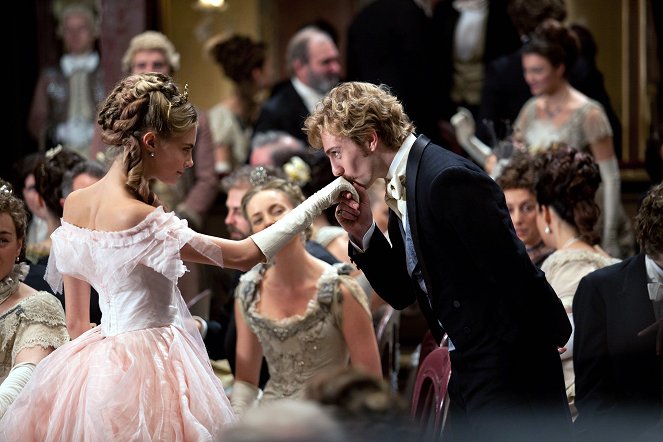Directed by:
Joe WrightScreenplay:
Tom StoppardCinematography:
Seamus McGarveyComposer:
Dario MarianelliCast:
Keira Knightley, Jude Law, Aaron Taylor-Johnson, Kelly Macdonald, Matthew Macfadyen, Alexandra Roach, Domhnall Gleeson, Alicia Vikander, Emily Watson (more)VOD (3)
Plots(1)
The timeless story powerfully explores the capacity for love that surges through the human heart, while illuminating the lavish society that was imperial Russia. The time is 1874. Vibrant and beautiful, Anna Karenina (Keira Knightley) has what any of her contemporaries would aspire to; she is the wife of Karenin (Jude Law), a high-ranking government official to whom she has borne a son, and her social standing in St. Petersburg could scarcely be higher. She journeys to Moscow after a letter from her philandering brother Oblonsky (Matthew Macfadyen) arrives, asking for Anna to come and help save his marriage to Dolly (Kelly Macdonald). En route, Anna makes the acquaintance of Countess Vronsky (Olivia Williams), who is then met at the train station by her son, the dashing cavalry officer Vronsky (Aaron Taylor-Johnson). When Anna is introduced to Vronsky, there is a mutual spark of instant attraction that cannot - and will not - be ignored. (Universal Pictures UK)
(more)Videos (32)
Reviews (10)
I really enjoyed seeing Alicia Vikander’s face, as well as Kelly Macdonald's presence and Jude Law's performance. Everything else was pointless. The theater belongs in the theater and Keira can finally stop reigning. I still get the feeling from her that her supposed talent isn't half as pronounced as her eyebrows. On the other hand, I have perhaps never seen such mannerisms from Karenina before. And that's saying something.
()
Joe Wright experiments instead of sticking to the concept of a subtle and rhythmic whirlwind of emotions like in Atonement. This theatrical attempt of his doesn't have the right grace, and thanks to the varying pace and the overall bland tuning of the film, it's boring in the finale, even with Keira Knightley giving a great performance – if it weren't for her, it would be mediocre. The fateful novel could have been used "the old-fashioned way" about 100 times better.
()
A beautifully made, pointless thing. Really, even though I can appreciate the way the film is made, in a theatre backstage, this approach doesn’t bring any added value. Actually, I thought it was counterproductive, because the loud unrealism distracted me from the characters, which means that Anna Karenina missed me completely on an emotional level – with the minor exception of sowing hatred towards the protagonist.
()
Lev Nikolayevich Tolstoy is one of the most respected novelists of realist Russia, and "Anna Karenina" is one of his most well-known novels. It is a extensive work that has been adapted into a more or less two-hour film. When comparing it to the slender "Hobbit" which is stretched into three films totaling at least nine hours, I wonder where the mistake was made. Where Jackson has to set up the story by adding new plotlines or stretching unimportant passages, the creators of the last film based on the novel "Anna Karenina" had to cut back on the story. And so, the plot is minimal. It is quite sad, but that's how it is. Everything takes place in a screenwriting shortcut, with only the most important moments being left, which then revolve around the characters of Anna and Vronsky. These two have the spotlight in the first half, and Karenin comes to the foreground in the second half. The other characters are not extras, but their importance to the story is limited and temporary. The story of Princess Kitty and Levin or Oblonsky and his wife are outlined, but they are just side episodes that do not have such an impact on the fate of the main character. What disappointed me the most, however, was the lavishness of the film. I expected a grand drama with beautiful costumes and sets, but all I got were the costumes. The story otherwise takes place on a theater stage, there is a curtain, there are ropes, everything. The effect is mainly that the film looks cheap. If this approach was chosen to show that Russian aristocracy was truly just a theater, cut off from the real world, existing on its own rules that don't have much in common with reality, I understand the intention, but I simply didn't imagine "Anna Karenina" this way, and I don't think this concept of the film helped significantly. More: http://www.filmovy-denik.cz/2012/12/sherrybaby-lets-dance-unesena.html
()
A melodrama that is afraid to fully submit to its melodramatic nature. By rendering the mise-en-scéne in a theatrical manner, the film’s creators established a perfect alibi in the event that anyone wonders why they would adapt a novel about sincere love and the search for mental balance in our cynical age of virtual relationships. After all, they can defend themselves by pointing out that the whole thing is just theatre of the Russian nobility, an insular world of grand feelings. However, I have no idea how they intend to justify the degree to which this bold stylisation is superficial. The decorations, lighting and camara movements mostly serve the purpose of nonverbally expressing what has already been said in the dialogue. The duplication of information makes the film overly simply and longer than the utilised portion of the book needed to be. Also, it seems that the selection of situations from the book was subordinated to the formalistic aspect. Every pretext for more dynamic movement (dancing, ice-skating, horse races) was employed, some more than once (the unforgettable grain harvest). ___ The action on the surface draws attention away from the peculiar emotional coldness between the characters, especially Ann and Vronsky. Keira’s role suits her, even though she is too young, too slender and her hairstyle and costumes and the spotlights illuminating the stage do most of the acting for her. Aaron Taylor-Johnson, however, was cast completely against the type of the protagonist that he has to portray. No charisma, no body, no respect. His amiable smile evokes the impression of a cub, not a lion of the salons. It’s also his fault that the tension within the intellectual rather than directly amorous triangle doesn’t work, because in his lack of boldness he definitely fails to embody unbridled passion, the opposite of the settled family life from which Anna turns away for little apparent reason. The fundamental weakness of the central romantic relationship, however, lies in the filmmakers’ cluelessness in how they present Anna’s moral lapse in a way that today’s viewers will understand. They don’t want to egg her on, but they don’t want to judge her either. As a result, they show her as being emotionally agitated, not knowing what she actually wants, and consequently heading for ruin. In the book, her motivations and those of the other characters are much clearer, which is in part due to the constant “switching” of points of view, though from today’s perspective they come across as somewhat old-fashioned, which is still better than Wright’s pseudo-modernism. ___ As long as Konstantin Levin’s storyline, which is given priority even over Anna’s storyline in the book, is factored into the film, it deserves to be fleshed out to a greater extent. The quick postscript, aided by the simplest symbolism, comes across as very banal, and the male protagonist, who should have undergone the most complex character transformation, ultimately gives the impression of a well-meaning farmer who has suddenly been enlightened. Despite that, Levin’s relationship with Kitty is more convincing than Anna’s love for Vronsky. This is paradoxically due to the visually simple scenes, when the camerawork settles down and the lovers don’t even have to say anything in order for us to understand what is going on between them. In that moment, the film is actually and honestly about repressed, inexpressible love, and it doesn’t try to excuse its melodramatic nature with a theatrical arrangement. ___ Due to its preoccupation with form, regardless of how breathtaking and reminiscent of the camera dances from Ophüls’s opuses it may be in places, the film unfortunately greatly reduces the intellectual potential of the book, which is sometimes shifted to absolutely inappropriate tones (in the genre of vulgar sex scenes) in an effort to be outwardly impressive. While Tolstoy’s contemplations take the form of trivialised symbols in the film, Anna Karenina is inspiring in its new theatrical “rewrite”. The release of Levin, and briefly Anna, into the more authentic outside world, which involves more than just romantic relationships, essentially casts doubt on the meaningfulness of all sentimental dramas. Though the transitions between the inner and the outer are not handled very imaginatively, I consider the admission that there is something outside of this gleaming melodramatic aquarium to be a very telling sign of the times in which we live. Even in a film about emotional problems, those problems are no longer perceived with the same sense of urgency as they were before. ___ In the end, this Anna Karenina belongs more to Stoppard and Wright than to Tolstoy, and I’m afraid that if the director hadn’t had the foundation of a solid screenplay, he would have played around even more with the visual aspect and would have told even less of the story. All I ask is that next time he doesn’t abuse a book that still has something to say even without the forcefully added visual frills. 75%
()
(less)
(more)



Ads